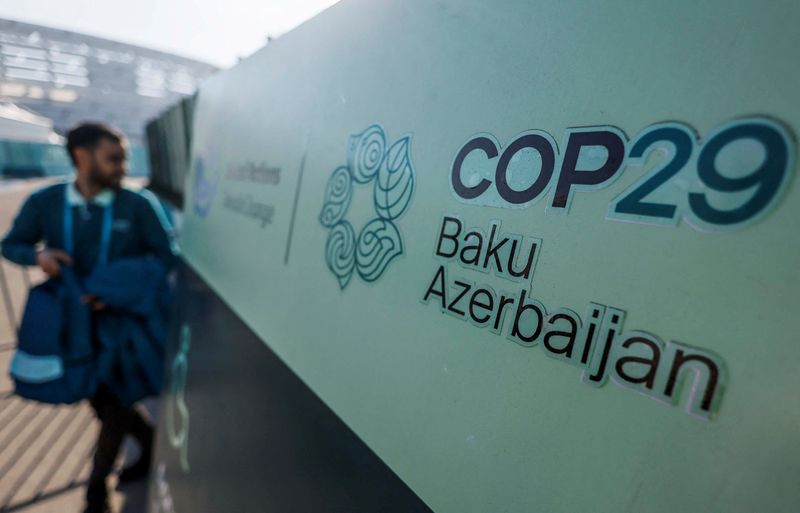By Valerie Volcovici
BAKU, Azerbaijan (Reuters) – Russia has included the territories it occupies in Ukraine in its current greenhouse fuel stock report back to the United Nations, drawing protests from Ukrainian officers and activists on the COP29 local weather summit this week.
The transfer by Moscow comes as Russian President Vladimir Putin eyes potential peace deal negotiations with incoming U.S. President Donald Trump that might resolve the destiny of huge swathes of territory.
“We see that Russia is using international platforms to legalise their actions, to legalise their occupation of our territory,” Ukraine’s Deputy Atmosphere Minister Olga Yukhymchuk instructed Reuters.
She mentioned Ukraine is in contact with officers from the United Nations Framework Conference on Local weather Change (UNFCCC), the U.N.’s foremost local weather physique, to ask it to resolve the dispute.
Officers representing the Russian overseas ministry and the UNFCCC didn’t reply to requests for remark despatched on Thursday.
At subject is Russia’s Nationwide Stock Report of greenhouse fuel emissions for 2022, which Moscow submitted to the UNFCCC on Nov. 8. Within the submission, reviewed by Reuters, Russia mentioned it might solely present knowledge for 85 out of 89 of its territories “due to the absence of baseline data on land use for the territories of the Donetsk People’s Republic, Luhansk People’s Republic, Zaporizhzhia and Kherson regions, annexed in September 2022.”
Russia had already included emissions from Ukraine’s Crimea area, annexed in 2014, in its previous couple of reporting submissions to the UNFCCC. It additionally included Crimea’s land growth plans in a report back to the U.N. World Biodiverity Framework in 2020.
Ukrainian Atmosphere Minister Svitlana Grynchuk raised the difficulty in a speech to delegates on the COP29 summit earlier this week, saying Russia’s reporting on Ukraine territories undermines the integrity of world local weather efforts.
Yukhymchuk instructed Reuters this concern relies on the chance of double-counting of emissions over territories that collectively exceed the scale of Portugal and Azerbaijan.
“It will bring us to a point that we do not achieve any of our goals if we don’t have proper reporting under the Paris Agreement,” she mentioned.
Nikki Reisch, director of the Heart for Worldwide Environmental Legislation’s Local weather & Vitality Program, mentioned the dispute mirrored how geopolitical turmoil was diverting the world’s consideration from the work of preventing international warming.
“I think that is a sign of the times,” mentioned Reisch on the sidelines of the COP29 summit.
“We’re living amidst rampant conflicts, and that is certainly infecting these talks.”
Christina Voigt, a regulation professor on the College of Oslo, mentioned Russia’s reporting on Ukraine emissions violated Ukraine’s sovereignty and could possibly be unlawful.
“Claiming emissions is perhaps not illegal – but claiming emissions as if they were from their own territory, while they are in fact generated on another country’s territory, is a unilateral declaration in violation of the international legal status of that territory,” Voigt mentioned.

She mentioned Russia’s declare of the annexed lands’ emissions might change into much more problematic if Moscow ultimately claims emissions reductions on these lands and provides them as offset credit to carbon markets.
“This would indeed be an illegal appropriation of a good belonging to the other state,” she mentioned.




